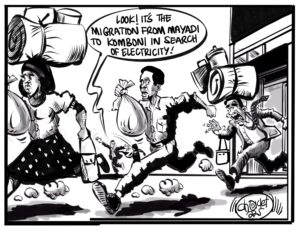THE Food Reserve Agency (FRA) says it is not compelling farmers to sell maize to them, contrary to assertions by the Zambia National Farmers’ Union (ZNFU) who suggested that farmers were being threatened if they did not offload their produce to the Agency.
But the FRA says it is currently facing challenges in buying maize in the Southern Province as farmers in that part of the country are scared to sell their maize to the Agency following the drought experienced in the last farming season.
Last weekend, ZNFU president Jervis Zimba alleged that the Union had information that farmers were being threatened of being blacklisted from accessing the Farmer Input Support Program (FISP) if they do not sell their maize to the FRA.
“The ZNFU has discovered a scam where some civil servants, including camp officers and District Commissioners (DCs) have been threatening farmers of being blacklisted from accessing FISP if they do not sell their maize to the FRA. The Union would like to challenge the Ministry of Agriculture and the FRA to come clean and state their position on this matter. We are cognizant of the fact that FISP is a Social Cash Transfer meant to help vulnerable, but viable farmers with inputs. But what the FRA is doing is actually injecting more poverty in farmers with their pricing mechanism as farmers are being forced to accept a poor price. We know that the FRA is having challenges to buy commodities from farmers. We also know that the Agency will not meet its target to mop up one million metric tonnes because of its pricing regime, but using streetwise methods to bully farmers into taking a price offer is unacceptable,” read the statement in part.
But in an interview, Kafwabulula urged Zimba to be factual in his sentiments and not get excited when speaking to the media.
“I saw that, and normally as a technocrat and as a professional person, I don’t like talking unnecessarily in the press. I mean, I am self-respecting, really, but sometimes you see, you are forced to respond, normally I would not respond. I do not know, and I am speaking as CEO, I do not know any employee of FRA who was telling farmers to do that, but just in case there is someone or some members of staff of mine who are doing that, let me know in which district they are doing that and which satellite depots. Mr Zimba should learn to speak things with evidence, he is a mature person. When he speaks, he should speak with evidence. At that level, I expect when he speaks, he should speak with evidence. I want to know which member of staff, even if for arguments sake they don’t know the name, I want to know in which location. Let’s not get excited. You see, when we are speaking to you, the press, we should be factual,” Kafwabulula said.
“But for arguments sake, if there was to be such a thing, that will not fall within the precincts of FRA, that will be a policy issue, and again, Mr Zimba should learn to differentiate between policy issues and management issues. I am telling you if there was to be that kind of decision to say, ‘those who got FISP then should sell to FRA,’ that announcement or decision cannot come from FRA, it can only come from the policymakers because that is a policy issue. And you see, Mr Zimba has a tendency of entangling himself in issues; he has just entangled himself, he does not know the difference between managerial and operational issues on one side and also policy issues. If ever a thing like that was to happen in this country, that would be announced by the policymakers. In fact, we as FRA, if we were to start doing those kinds of things, we will be in problems, we would be in trouble with the policymakers because that’s not our role. But the problem here is that Mr (Calvin) Kaleyi (ZNFU public relations manager) and Mr Zimba are failing to differentiate between operational issues and policy issues, that’s where the problem is.”
But Kafwabulula expressed concern over Southern Province farmers’ refusal to sell their maize to the Agency for fear of hunger, even when they had more than enough grain, which may go to waste.
“So far, in certain areas where it was a bit slow, I have seen some increment like in Chama, but the way we are going so far, I think we are not bad. Especially considering that we still have this month, August, we still have September, we still have October and part of November. We still have a bit of time ahead of us. Of course, we are having a few challenges in Southern Province. Southern Province has got a lot of maize, but the challenge that we are having is that the farmers are scared because last year, there was a drought, so they are scared; they don’t know whether to sell or not to sell. If you look at the national production, for Southern Province alone, first and foremost, the total production for the country was 3.3 million metric tonnes. But if you look at the figure for Southern Province alone from the 3.3 million MT production, the province is about 488,000 metric tonnes, it’s a lot of maize, but the farmers there we’ve been talking to are scared to sell, they are saying, ‘no, but last year, we had a drought so if we sell you, we may be at risk’,” revealed Kafwabulula.
“…But we are working on strategies to convince them because 488,000 metric tonnes, even if they want to keep some for household food security, which is good, but still the maize that they are sitting on is just too much because the next thing, they may not be able to keep this maize. You know, maize is very sensitive; it has to be fumigated, otherwise, before they know it’s going to be attacked by pests and it’s quite expensive to keep maize and to control the pests. So, we are trying to work out modalities and strategies so that we can encourage them to sell to FRA on one hand. Then on the other hand, of course, we appreciate they should have household food security, so that’s the challenge. They are saying, ‘last year, we were depending on DMMU (Disaster Management and Mitigation Unit) to feed us so we are scared to sell.’ But we are penetrating and we want to convince them, but we are also alive to the fact that farmers must have something to feed their families.”
























